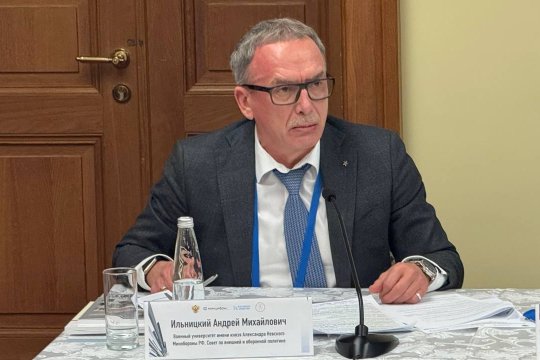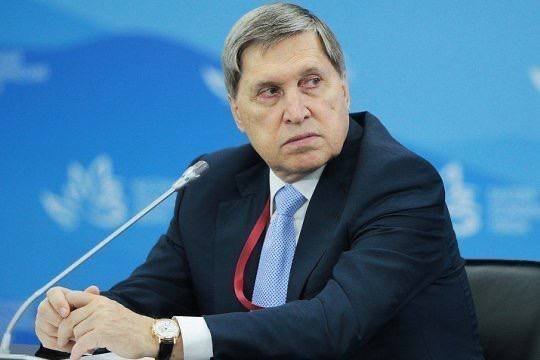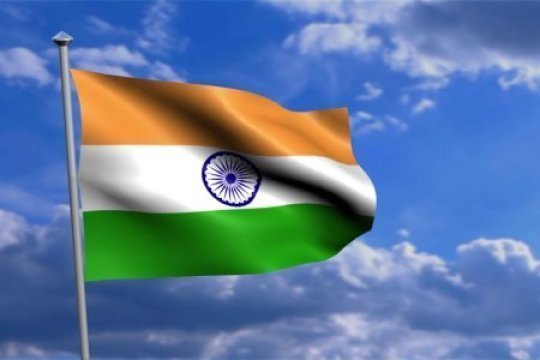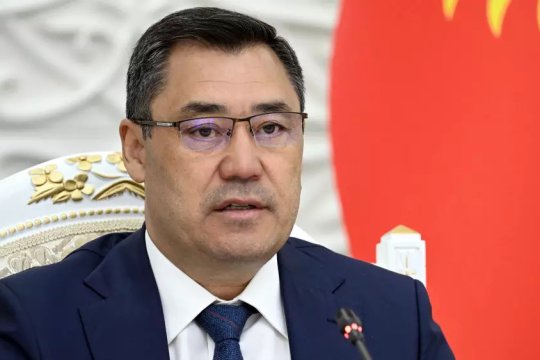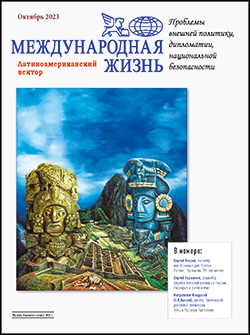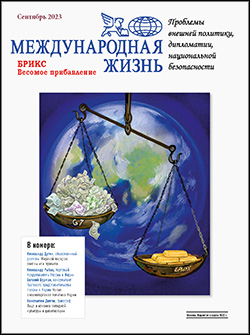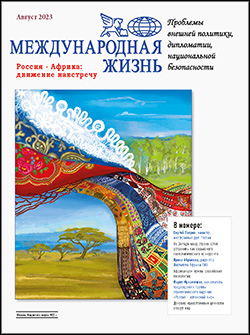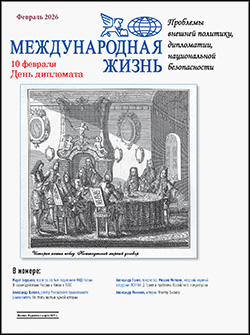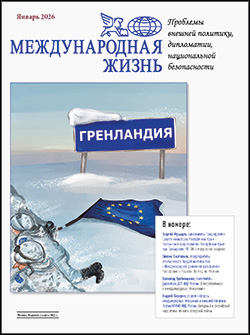Radio Interview with Minister of Foreign Affairs of the Russian Federation S. Lavrov
On October 21, 2001 Russian diplomacy chief S. Lavrov gave the first ever radio interview to the Voice of Russia, the Radio of Russia, and the Echo of Moscow
The Arab Direction
In Libya
Debate
The Soviet Union's and Russia's ambassadors who, in various epochs, held their posts in Libya, along with career diplomats engaged with the Libyan theme, convened at a round table hosted by International Affairs and the Moscow State Institute of International Relations to examine and discuss the Libyan crisis
The Arab World's Fitna, or What Looms Ahead for the Troubled Middle East
O. Pavlov
Experts hold that the unrest across the Arab world provides Washington with a pretext for absolving the US from responsibility over the collapse of the post-September 11 agenda – an ambitious plan to infuse democracy and new values into the region - and for switching to a new, potentially also short-living, program
African Union and the Libyan Crisis: Will the Voice of Africa be Heard?
A. Boguslavsky
The roadmap suggested last May by the African Union High‐Level ad hoc Committee on Libya, a forum which comprises the presidents of Congo, Mauritania, Mali, Uganda, and South Africa plus the commission's chairperson Jean Ping, is a reasonable platform for opening up dialog in the country torn apart by the ferocious conflict. Moreover, if the plan of the African Union gains acceptance, it will be fair to say that the principle by which Africans are to solve the problems of their own continent begins to materialize
EDITOR'S COLUMN
What Gaddafi Was Able to Tell the International Court
A. Oganesyan
The view expressed by B. Obama – that Gaddafi’s death sent a strong message to dictators all around the world – resonated with the media across the West, with those in Germany seeming to be a lone exception from the rule. It is a big question, however, whether the message is consistent. One might argue, for example, that the lynching of Benito Mussolini and his mistress Clara Petacci who were hanged heads down hardly sent a stronger message than the Nuremberg Trials which served to expose with striking clarity the bestial nature of fascism
POLITICS
Cooperation in the Nuclear Sphere Between Brazil and Argentina
Antonio de Aguiar Patriota, Héctor Timerman
This year comes the 20th anniversary of the signing of the Brazil-Argentina agreement on exclusively civilian nuclear energy. As a part of the deal, both countries assumed the obligation to never cultivate, stockpile, or use nuclear weapons and pledged to confine their use of nuclear power to civilian purposes. The Brazilian–Argentine Agency for Accounting and Control of Nuclear Materials was established based on the agenda
Russia-China: Understanding and Trust Achieved
I. Antonov
In many regards, Russian prime minister V. Putin's October visit to China differed from more ordinary high-level diplomatic tours. Mindful of the underlying themes, commentators and watchers were tempted to guess which subjects – and with what results – could have been touched upon during more secretive phases of the negotiations
Permanent Importance of the Legacy of the Nuremberg Trials to the Mission of Safeguarding Peace and International Security Against Traditional and Emerging Challenges
A. Varfolomeev
Two key events were commemorated last fall. September 11 marked a decade since the bloody terrorist attack on the US, and October 1 was – for the whole world or, at least, for the part of it mindful of the deepest historical experiences – the 65th anniversary of the Nuremberg Trials which led to the sentencing of the top Nazi criminals. Combined, the two dates reflect the superposition of the traditional and emerging challenges confronting the mankind
MULTILATERAL DIPLOMACY
Russia Eyes BRICS in a Search for Alternative Partnerships in World Economy
T. Isachenko
BRICS may be at the center of the world policy debate, but until recently the Russian perspective on the alliance used to be built around global political architectures and shared positions in international affairs rather than on the economic potential of the engagement with the alliance. Assessments of the corresponding economic opportunities vary widely, and the purposes of the present paper are to create a framework for the economic part of the discussions and to pinpoint the alternatives the cooperation with BRICS offers to the economic priorities currently adopted in Moscow
The UN and the Struggle Against International Terrorism
E. Vasnetsova
The development of international anti-terrorist programs was propelled to the top of the agenda by the September 11 drama. As of today, the international legal regime of the anti-terrorist activities has taken shape, with the UN documents – conventions, resolutions, declarations, etc. – playing the essential roles
MOSCOW DIPLOMATIC CORPS
Nine Decades of the Diplomatic Relations Between Russia and Mongolia
Doloonjin Idevkhten
The friendship treaty between Russia and Mongolia was signed in Moscow on November 5, 1921. The agreement became the backbone of a lasting partnership between the two countries. For Mongolia, ties with Russia remain a priority, and the past several years saw a considerable intensification of the political interactions between the two countries
HISTORY MILESTONES
P.A. Stolypin's Reforms and Russian Interests in Foreign Politics
E. Voronin
The program of the sweeping Stolypin reform – of the renovation of Russia, as contemporaries described it – had a significant foreign-policy component. So far, little attention has been paid to the diplomatic aspect of the transformations set in motion by Stolypin
BOOKSHELF
Soft Power: a New Study of the French Contribution to Russian Intellectual Life
E. Obichkina
A joint Russian-French study titled “The French Contribution to Russian Academic and Intellectual Life in the XVIII-XX Centuries” and released by the Institute for World History of the Russian Academy of Science is based on the proceedings of a Moscow conference organized by the Roland Mousnier Center, the archive of the Russian Academy of Science, and the Russian State University for the Humanities
Where We Stand in the World
E. Anan'eva
The monograph “Russia in the Concert of Civilizations” presents a spectrum of views on the key trends of the socioeconomic and political evolution of the post-Soviet Russia. The polemic character of the materials included should draw additional readership to the book as at the moment neither Russia nor the West seem to be certain where our country stands in the world of today
A Useful Study of the Russian Diplomatic Protocol
N. Kozyrev, A. Volodin, P. Razvin
I.N. Semenov's “Russian Diplomatic Protocol: History and Modernity” is a profound study spanning the key periods of the Russian statehood and, accordingly, of the national diplomacy which helped advance the country's foreign-policy objectives
Limits of Defense and Security
A. Frolov
The relations between Moscow and NATO constantly grab the Russian media headlines as the society weighs various options including the merger of the country into the alliance, a distanced position vis-a-vis NATO coupled to active protection of independent national interests, or the Eurasian orientation. The book “The Army of the New World Order” by V. Shtol', a renown Russian political scientist, is a valuable addition to the ongoing debate.
The Social Europe
N. Promsky
Institute of Europe of the Russian Academy of Science published “The Social Europe in the XXI Century”. The present epoch is marked with global shifts which seriously affect Europe. The dynamics has profound socioeconomic repercussions and it currently appears that social problems will, in the long run, define the outlook throughout the century
Around the World on 400 Pages
P. Timofeev
The 132th issue of Politique internationale, a French political affairs quarterly, is dedicated to the themes of Europe's current embarrassments, to the revolutions in North Africa and the Middle East altogether known as the Arab Spring, and to the global role of the US in the wake of the 2008 crisis
Читайте другие материалы журнала «Международная жизнь» на нашем канале Яндекс.Дзен.
Подписывайтесь на наш Telegram – канал: https://t.me/interaffairs

 14:24 07.11.2011 •
14:24 07.11.2011 • 